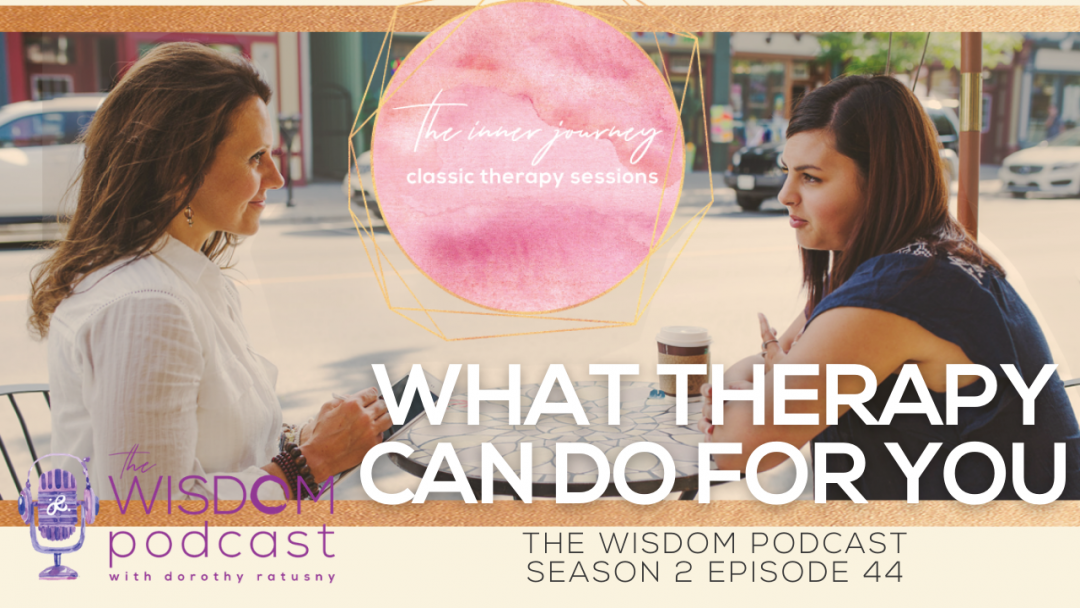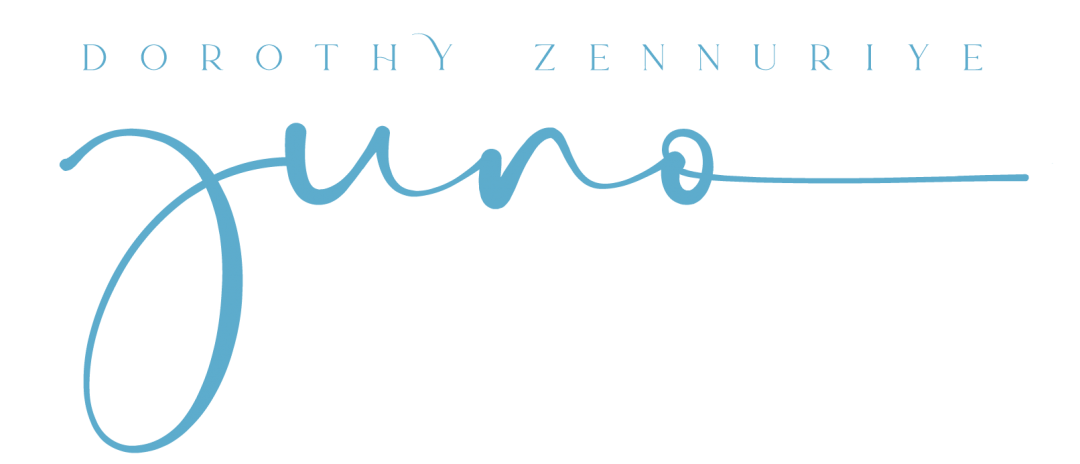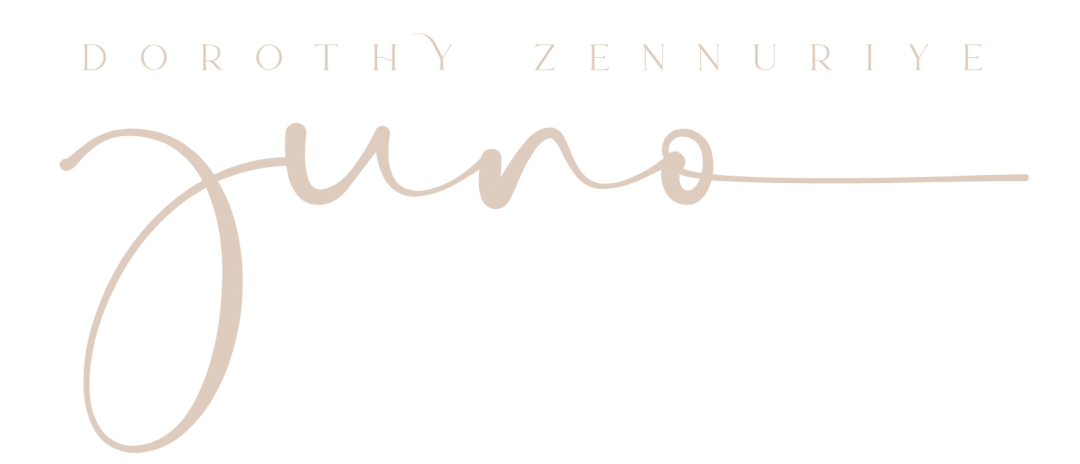
This Is What Therapy Can Do For You
The WISDOM podcast Season 2 Episode 44
with Dorothy Ratusny
TIMESTAMPS:
Podcast Theme Intro: 0-2:02 | My Introduction and What Therapy Can Do For You: ? 2:03 | My Client’s Diagnosis of Bipolar: 3:30 | Therapy is Far More Than Talking About the Past: 4:40 | The Two Positive Outcomes of Therapy That We Will Always Arrive at Together: 5:13 | Even After Healing Has Been Complete… 6:39 | Think of Therapy As a Healing Paradigm: 9:04 | Therapy Teaches You About Yourself: 11:05 | The Tools and Best Practices of Therapy: 18:17 | Three Reflective Questions PDF: 28:06 | Good Therapy Is… 23:22 | My Client: An Afterward: 28:56 | Podcast Theme Outro: 33:00 |
If you have ever wondered what a session of therapy could do for you; sit back and take in this message.
How does one identify, effectively all of the ways that therapy can be of help? How do we do this without embracing the experience itself when the idea of talking with someone can be overwhelming for some who don’t know where to begin, or how it can truly help?
TRUTH SERUM: In the past, the stigma associated with mental health has been a deterrent to seeking therapy.
What we are witnessing now, in this turbulent time of ongoing change and uncertainty, and with millions of people all over the world, experiencing more alone time and isolation than in any other time during their life, the effects of prolonged stress and the lack of support of mental health strategies and skills needed to live a healthy and productive and happy life; make it important to have the best therapeutic practices that are accessible by all people and in all languages and as much as possible – affordable and or free.
REAL CLIENT STORIES: When my client (who was), diagnosed with bipolar disorder at age 18, some 20 years later; is in a spell of low affect; when her cognitive ability is challenged; simple processing tasks are impeded.
It is more difficult for her to make decisions for example, and to feel motivated to complete daily tasks.
Her usual upbeat and larger than life personality becomes submersed in what is now a quiet and somber, depressed version of herself; one that lacks confidence, and is often tormented by thoughts of ‘being a burden’ to her loved ones.
Her words to me in these moments as well as when she is feeling ‘like herself’ and happy again, are substantial to us all. She reaffirms the simple truth: ‘Your mental health means everything’. She is right.
A-HA MOMENTS: Therapy is far more than talking about a traumatic childhood event and reliving its scaring impact.
In fact, the way that it helps best to deconstruct a past event or trauma is to examine it from an enlightened perspective; to understand the situation and the context in a way that allows for healing, forgiveness, acceptance, peace – and the idea that whatever happened, and for whatever was done “to you” there are always going to be two positive outcomes that we will arrive at together.
(1) The first outcome of therapy is a more accurate comprehension and understanding of the situation and the new insights and discoveries that arise out of a search for greater meaning and from that, the ability to come to acceptance. Acceptance does not mean agreement with what has happened, but rather the willingness to acknowledge what has already occurred.
This allows you to psychologically move into a place of action; of rendering what will be the action that you need to take whether as an approach to how you think or what physical actions will help support you best.
(2) Second, healing occurs when you hold acceptance of ‘what is’; emotional, psychological, cognitive, spiritual, and often physical in the relief of symptoms that were once related to the situation of the past and your perspective of it. This healing is the return to your wholeness that you; that we all – are inherently seeking.
PRACTICAL WISDOM: Even after the majority of healing has been completed, therapy can continue to be a place where one experiences growth in other areas of one’s life; and hence the ripple effect of what it means to learn and discover more (about one’s self, including the different choices one may choose with greater understanding and perspective).
As a side note, it’s not about making excuses for someone’s behavior, or disavowing your feelings and how you have been impacted by a situation or another.
Rather, examining the past from the vantage point of a different perspective that I or another therapist can help with, brings new insight and awareness that allows for healing and to alleviate some or all of the pain and suffering that one may have been holding onto.
Having a safe and therapeutic place to unpack what has happened within a framework of learning a healthy means for processing the situation whilst supported and validated in their experience, means that a client will have help and guidance as they now feel more confident and also alleviated in their suffering.
This is what fosters growth and evolution; and the learning of new approaches and strategies to live more successfully, as one is supported in their continued growth even as similar or related situations may arise or continue.
Think of it as having new tools and strategies because we are not going to change others but rather how we think and feel and react in situations when others are behaving the same. We are also going to rethink the parameters we have in some of our relationships when others are not able or willing to make changes.
If you can think of therapy as the healing paradigm for whatever has happened; whatever has affected you in a way that has made it difficult in other places of your life; it makes sense that some people have chosen to be in therapy for a lengthy time.
Therapy can be a wonderful source of support and learning in a dedicated space outside of the typical aspects of your life where you can explore your thoughts, feelings, behaviours in the context of what you were taught to believe, and a source for inspiration and as a different means for how you will choose to experience the rest of your life.
Many clients are relieved to discover that they don’t need to continue to remain mired in the habits and behaviours that have never served them, now that they have alternative strategies and mutually helpful habits and behaviours in place.
If you have a supportive and trusting rapport with a therapist; and of course confidence in them to be the right person to help you; you may continue to receive helpful guidance and insight for as long as you choose; for as long as you wish to have this therapeutic alliance and a safe landing place that you return to as you need or wish; whether that becomes bimonthly, twice a year or perhaps again for an intensive weekly series of sessions for a time as a new life event or situation may require additional support as you process and best navigate what is in front of you.
The process of therapy teaches you about yourself and also how to implement what you are learning; into your life in practical ways that allow you to make the positive changes that you seek and that are needed in order to support yourself best.
What makes for an excellent experience in therapy is a place where you can sift through your thoughts and feelings in the safety and presence of someone who willingly holds the space for you to be.
One of the best outcomes of therapy is the ability to know yourself even better, to challenge and rewrite what beliefs hold you back, in the absence of judgment and in the presence of another who is able to help you make the connection between your experiences and what learned beliefs have shaped who you are up to this moment.
Sometimes you are in search of a solution, or answers to your questions of uncertainty. Sometimes, therapy is an intervention after you have on your own and for a time, aimed to change a behavior and now needing help to ensure that the change is long lasting. The truth does set us free.
Therapy can also help you to understand and know from where within yourself you may access your inner wisdom so that you can become confident in knowing yourself best, and in making the right choices for your life.
In therapy, you are able to explore the never before ‘heard out loud’ thoughts that you have kept buried in your mind. These thoughts and perceptions hold the secret to how you feel and what you live. To bring them into the forefront; to hear your voice as you say them aloud, begins the process of experiencing; of being witness to how the mind formulates and justifies and how the ego in particular serves to protect through its many defenses.
The inner dialogue that often goes under the radar, means that we continue in similar habits and patterns even when we know on a subconscious level that what we are telling our self and believing is not helpful. Inside your mind you continue to rehearse and reinforce the messages and statements that were critically spoken to you. Now these same words continue to reinforce a belief that was never true.
In therapy, you voice your inner dialogue and the thoughts and beliefs that you hold on a topic that has weighed heavily on your mind and heart so that you may examine in detail, whether what you tell yourself and believe is even true; and to explore what beliefs you learned that are not accurate, and that have been limiting all that you wish to be.
As you bring honesty and truth into the light of your experience and in the presence of the other caring being of whom you have carefully chosen, to help and guide your journey, your previous perspective and thought patterns now shift to one of enlightenment.
In the context of therapy, using additional tools for calming the mind such as breathing techniques, mindfulness, meditation, and mantras, help to illicit clarity; and for one to be able to witness the accuracy of one’s thoughts rather than the cognitive distortions and inaccuracies in a biased perspective that we all experience whenever we tell ourselves something that is untrue.
For example, if you have ever been self-effacing and self-loathing; you are telling yourself and believing thoughts that diminish and uproot your self-esteem, confidence, and self-worth. These thoughts have a powerful impact on how you think and feel about yourself and are often far removed from what is true.
When you begin to witness this in the moments in which it occurs, your mind, is now free to pursue what is important to you and without the limiting beliefs that cause self-doubt and discouragement or even perceived failure.
This wisdom, this emergence of light, where there was darkness, metaphorically helps you to witness all of what you are. This is the abundance that sets you free and into the light of day.
I have this incredible view of therapy and what it can do for someone who is open and willing to receive all of its benefits because I live in both realms. Let me explain. I began my journey into the world of therapy quite organically. It would seem that I had, as most young children do; an instinctive and unrelenting desire to have and know truth; and of course children do their best to believe their caregivers even when they have a gnawing sense that they are not being told the truth.
Adults are not always comfortable when their child can tell when something is wrong; or when they are sad or not at their best. Think back to a time when your child or any child questioned you and you may have for whatever reason, denied what could have been an opportunity to validate your child’s intuitive wisdom when they could sense that something was not quite right. It’s coming back to our organic sense of using our intuitive wisdom and our senses that, allows us all to thrive in the world.
Therapy provides you with the tools and the scope of best practices of which to better see yourself as you are rather than through the veil of how your ego (mind) serves to build more of how you have been living in the world inside your mind.
You can learn on your own to become aware and mindful of what thoughts you hold. You practice this as you say aloud what you have been voicing, repeating, even ruminating on in the space that only you are privy to. The same space inside your mind in which you cultivate the deeper experiences of your life by what you focus on and what your inner dialogue is; and what feelings are but the result of this.
Each one of us is a self-contained world. Our intentions intercede with those of others. Each one of us reflects outward the world that exists inside our mind together with the constant and ever-present bombardment of stimuli in the external world. How we perceive and are impacted by each of our experiences makes for a voluminous set of possibilities for when we interact with another.
Here in your willingness to unpack and release some of what has tormented you, you must be willing to examine it authentically and even to do so means that you will relive parts or all of what is already the past.
Having the tools and a new means of making sense of what has already happened presents some of the most helpful expressions of what it means to know yourself well.
I remember in my first of two year-long clinical internships, the small group of us were told that a part of the practicum of our training was to experience a year of individual therapy from the perspective of being a client. I know that at that moment, we all glanced at each other with a somewhat blank and perhaps inquisitive look.
I remember thinking, “What on earth was I going to talk about?” And amazingly, as what typically happens in a session, somehow what you need to speak about and what can help most, is precisely what finds its way to the surface.
Whenever I share this aspect of my training, I am so grateful to say that it was one of the best ‘surprise’ experiences of the clinical internship.
Because even as you are training in something, how can you know what something is truly unless you have the direct and personal experience? I don’t wish for my dental hygienist to have had cavities to know how to clean my teeth, but I would want to find a therapist that has gone through the experience of therapy and continues to walk the talk; and to always be seeking to become more.
The therapy scratched the surface of what I had already been investigating of my life; and it definitely gave me insight and a different perspective; and of course some of the tools to be able to excavate, process and understand the rest. Best of all, it gave me the experience of what it means to sit in the other chair metaphorically.
I have clients that will say how important therapy has been for their life, for their growth, for what has allowed them to get from there to here and they are emphatic in their assertion that therapy should be something that everyone has an opportunity to experience.
If it were not for my own year of therapy in my twenties, and then all of the self-directed work I have done since, including peer supervision to support my ongoing training and education in this profession, I would not understand nor know just how much I agree with that statement.
Good therapy will help you to heal in ways that you would not be privy to on your own unless you too as I did, chose to make it your profession and to continue in your own self-study, learning, and positive change.
I say ‘good therapy’ because it must first be a fit for you with the best possible clinician. There are several important criteria for what will ensure that therapy is most successful and also enjoyable; even in the moments and sessions in which there is also much emotional weight and revelation that can bring forth new insight and wisdom, and as you seek to understand and heal from past situations.
You bring as little or as much of yourself to each session as you choose; and as you feel safe to do to. There is a gentle balance in therapy between revealing more of yourself than you would to a friend or colleague and as you foster closeness and trust with your therapist, you will hopefully feel a greater willingness to reveal more and to learn more about yourself.
Remember that the deeper you go into your honest and true thoughts and feelings, the more vulnerable you may feel and the greater in depth you reveal and discover yourself including what stories and experiences have served to shape who you are. It’s a little like story telling from a perspective of being as honest and open as possible.
There are no limits or bounds to what you can accomplish to self-actualize, to grow, to transform, and to heal. Its okay if you need to change therapists, or even to take a break for a time if you need to do work on your own.
Therapy is effective guidance, and expert help that makes it so helpful to overcome a problem behavior or way of thinking; and of course, to help you best when you may be struggling on your own to solve and fix a problem.
I share this because this at a time in which we struggle with closeness and connection in part because many of us are working independently and alone from home; and as we are not able to socialize in the ways that we have always known, you are now more than ever left to be with yourself.
You may be willing to make time to be with your thoughts and feelings as a first step in learning how to better help yourself and this is a great first step.
It’s also okay if you are not ready or believe that you don’t need therapy. I would just hope that in sharing this information with you, you will feel a little more comfortable and at ease for when there may be a time that you are considering it.
Here I also wish to offer some strategies and help for how you may use this time in your life for introspection and greater self-awareness. There is a lot that you may do to understand and know yourself best; and to find your own best answers from within.
Therapy in a formal way with a skilled guide can help you ask the questions of yourself that need answers. Here I offer a short list of Socratic questions that you can ask yourself and then answer these most honestly and completely.
This will get you started along a path of mindful self-discovery. Think of it as a precursor to what you may then seek …to know, to learn about yourself, to create positive change, and to heal.
I’ve listed three reflective questions to get your started in your inner work here, in a free downloadable pdf. You may want to use these questions as journal prompts if you already have a journal writing practice in place. These questions will help guide you to know yourself even better and to take the steps of positive change.
As part of the pdf you will also receive links to helpful videos on more that you will want to know in discovering yourself and of the benefits of therapy. You can find these also on my website in The WISDOM BLOG.
And An Afterward:
In the case of my client, she is aware that when she is a low mood, her thoughts devastatingly become self-critical and self-effacing which causes her to feel badly about herself and her life; and which creates for her a cycle of unhappiness and self-loathing; to which she then feels unmotivated and even more displaced from herself.
As we have already many strategies in place for what she can do to help herself, this client and others use the pillars of healthy daily behaviours which become habits. These include measures such as exercise, good sleep hygiene, healthy eating, and the practice of mindfulness and meditation.
Yet, when her biology changes and she begins to feel her mood become more somber and sad, this client knows the CBT strategies to identify her critical and negative self-talk, and how to implement the strategy of challenging these thoughts and to replace them with what is true.
It’s a process that millions of others use everyday when practicing CBT. The difference being that, bipolar disorder in particular – causes serious shifts in mood, energy, thinking and behavior from the highs of mania on one extreme to the lows of depression on the other.
What is difficult for people who are diagnosed with bipolar is that what they experience is more than a fleeting good or bad mood. The cycles of bipolar disorder last for days, weeks, and also months as it does with this client; making it a larger endeavor to consistently monitor one’s thoughts and to replace these thoughts with positive statements based in truth; especially when one’s mood is already negatively impacted.
Thankfully, CBT and other forms of therapy do help; and clients report progress and relief, and also continue to work and have successful lives.
Therapy for clients diagnosed with mental health disorders becomes a place to continue learning tools, to be reminded of what is helpful and what works, and to have support for life’s challenges, and to feel successful and reassured in their ability to help themselves.
And a little more on how I practice:
I practice therapy using a Cognitive Behavioral Model (CBT) and I also bring in other therapy modalities such as DBT, ACT, and Positive Psychology. Many of the practical teachings within these therapies include Mindfulness teachings, and I also teach my clients Meditation, and Spirituality.
With all of that in front of you, if you have any questions or would like to have my help, please reach out to me. You can also book a free discovery session or dive right in to a session of therapy or life coaching with me. I am right here to help you. Thank you so much for joining me here. Namaste ?
More Resources Right Here:
Sharing the wisdom and beauty of divine love with you…
Namaste!
*If you have a question or if you would like my guidance or help, please reach out to me: dorothy@dorothyratusny.com
Find all Episodes of The WISDOM podcast here
Love in your inbox? Subscribe to my weekly WISDOM Notes here
A generous ‘thank you’ to Audio Engineer, P. Kirpikau for your excellent work! radioplato
Podcast Theme Music: ‘Aura’ from the Album, Illuvia by Eternell www.eternell.net/album/illuvia
Accompanying Music: Eternell, ‘Alcyone (energy transmission)’, ‘Eden’ (softer), and ‘Cove’ (underwater presence)














Leave A Comment
You must be logged in to post a comment.